Oscar Vault Monday – Cabaret, 1972 (dir. Bob Fosse)
Posted by Marya E. Gates
The first time I saw this film was during TCM’s 31 Days of Oscar in 2011 and a few days ago I gave it a much deserved re-watch. I think I liked it even more on this second viewing. There is a new Blu-ray edition coming from Warner Brothers, which I will be reviewing later this week. Cabaret holds the record for most Oscar wins (eight!) without winning Best Picture. I would be hard-pressed to choose between this film and The Godfather, too. Pretty much every year in the 70s had too many great, important, monumental and insanely entertaining pieces of cinema. In the end, I think the films’s awards are not as important as the impact of the films themselves. That said, Cabaret‘s ten Academy Award nominations were: Best Song Score or Adaptation Score (this category doesn’t exist anymore, won), Best Cinematography (won), Best Editing (won), Best Sound (won), Best Art Direction (won), Best Adapted Screenplay, Best Supporting Actor Joel Grey (won), Best Actress Liza Minnelli (won), Best Director (won) and Best Picture. The other films nominated for Best Picture that year were Deliverance, The Emigrants, Sounder and winner The Godfather.
Beware, there be spoilers below.
Bob Fosse was also nominated for Best Director for 1975’s Lenny and 1979’s All That Jazz (where he went up against Francis Ford Coppola again, though they both lost to Robert Benton for Kramer Vs. Kramer; both films won the Palme d’Or at the Cannes Film Festival, Apocalypse Now in 1979 and All That Jazz in 1980). Fosse was also nominated for Best Original Screenplay for All That Jazz (which was also up for Best Picture), an autobiographical film about the making of his previous film Lenny, while he was staging the original Broadway production of Chicago. I still haven’t seen Lenny, though it was also a Best Picture nominee, but I really love All That Jazz. Fosse definitely brings a mania to his films and he’s clearly got a vision is his head for what he wants, which is why he’s such a genius. In lesser hands, these films would feel muttered and confusing. Fosse choreographed 13 stage productions, 9 of which he directed or co-directed and directed five feature films before dying at the age of 60 from a heart attack in 1987.
Liza Minnelli is the daughter of Old Hollywood royalty Judy Garland (whose loss to Grace Kelly in The Country Girl over her performance in A Star is Born is arguably the most egregious mistake in all Oscar history other than How Green Was My Valley over Citizen Kane) and Vincente Minnelli. Liza was previously nominated for Best Actress for her work in 1969’s The Sterile Cuckoo. In this film, Liza plays Sally Bowles, American cabaret singer (who has been working like mad to be an international woman of mystery), with hopes of being a huge film star someday. Sally is energetic and full of joie de vivre despite living the life she’s lived and Liza brings that spirit out so vividly. I’ve yet to see Cabaret on the big screen (someday!), but I can’t imagine what that must have been like, with her big eyes and all that pizzazz.
Arguably her most iconic song performance in the film is her rendition of “Mein Herr,” clad in nothing but a black vest, sparkling tights and a bowler hat. Never has a chair been quite so sexy, never will one be again. In the original (non-musical) play, Sally is a bad singer and her dreams of being a real actress are clearly delusional. But in the musical version (for obvious reasons), Sally is a great singer and her dreams seem like maybe they might come true someday after all. Liza’s voice and presence make it seem even more likely, though as the story progresses, you realize the one thing Sally really doesn’t have on her side is luck.
At the time, Michael York was one of the most promising up-and-coming young actors, after his screen debut in 1967’s The Taming of the Shrew and his critically acclaimed performance as Tybalt in Franco Zeffierelli’s Best Picture nominated take on Romeo and Juliet. York plays a naive young academic named Brian who has come to Berlin while completing his doctorate in philosophy. He moves into the same boarding house as Sally, where he intends to give English lessons. As the film progresses, the two become great friends and eventually lovers. York’s infectious smile adds to the sense of wonder at everything that’s happening around Brian throughout the beginning of the film. As Brian begins to learn hard lessons about life and love, he never quite loses that spark – neither does Sally – and really, that is my one complaint about the film. In the stage production I saw in college, the ending was very sad and both the characters left slightly damaged and for some reason Fosse didn’t do that with this film. There’s still hope for them – though the final image, which I will discuss later, looms over all of Europe.
This film does not work if its two leads have no chemistry, which is why this film works wondrously. Minnelli and York sizzle together whenever they share the screen. I’m not sure why York didn’t also receive an Oscar nod for his work in the film. I guess when you have the one non-singing role in a musical, your work automatically gets null and void? Regardless, York holds his own against the force of nature that is Liza with a Z.
Fritz Wepper plays one of Brian’s students, also named Fritz. He is a gigolo looking for a wealthy woman to marry, but what he finds is something much more. Wepper gives a wonderfully comic and tender performance in the film’s most poignant subplot.
Joining him is Maris Berenson, as the object of his attention, a rich Jewish bachelorette who also comes to Brian for English lessons. When we first meet Natalia, all those in the boarding house are excited to have a woman from such a rich household visit them, but as the film progresses and the Nazi party rises – along with them rampant anti-Semitism – their attitudes change. As does Fritz, who realizes he actually loves Natalia, which in turn causes him to share his biggest secret – that he is also a Jew. Their story is both touching and full of melancholy, as we the audience know what is about to happen in Europe. Although nominated for a Golden Globe for Best Supporting Actress, Berenson failed to receive an Oscar nomination for her performance in this film. I also recommend her work in Stanley Kubrick’s Best Picture nominee Barry Lyndon.
The first English lesson with Natalia is one of the most humorous sections of the film. Everyone is at the top of their comic games, without once seeming like they are trying too hard. It’s moments like this in the film that show its genius on many genre-defying levels.
Another subplot in the film involves Sally’s meeting of a playboy Baron played by Helmut Griem. The Baron buys Sally things and creates a wedge between her and Brian, which culminates in one very explosive scene. Brian shouts “Screw Maximilian!” To which Sally responds, “I do.” Which Brian retorts with, “So do I.” In 1972 the Hays Code had only been abolished for about four years and bisexuality was still a bit of a taboo subject in mainstream Hollywood, and yet here it was in all its glory.
I love this tight close-up so, so much. This is their entire story in one shot. This says everything. This was a bold shot to include in 1972 and I think it’s just as powerful a shot now as anything much more graphic we might have in a contemporary film.
During their ill-fated trip to the country, Sally, Brian and Maximilian pause for a rest at a beer garden just in time for a really creepy rendition of “Tomorrow Belongs To Me” by some Hitler youth. This is probably the most hair-raising part of the film and remains as terrifying now as it was in 1972. Earlier in their relationship, the Baron said he thought the Nazis were something the Germans would be able to control and Brian did not buy it; after this scene Brian asks him if he still thinks that. Just a few scenes later, Maximilian sends them a note saying he has fled to Argentina. One can only hope Fritz and Natalia flee before all Hell breaks loose, too.
After the Baron flees, Sally discovers she is pregnant and is unsure who the father is. I love how Fosse staged their discussion: she tells him in a library and everyone is shocked, then it cuts to this amazing shot of them in the street. You can see a swastika in the foreground and Sally and Brian, small in the background. I’m sure you could write an entire essay just on this shot alone.
Which brings the film to yet another taboo subject: abortion. Sally has talked to a doctor, but it’s going to be expensive. Brian asks her to marry him instead, and in true Cabaret fashion, the two have a lavish indoor drunk to celebrate where everything seems great. This is followed by an outdoor picnic where Sally seems a little less sure. This is followed by a crazy montage that I still don’t quite understand that culminated in Sally coming home late at night sans fur coat (a gift from the Baron). She has had the abortion after all. At first she says it was “one of her whims.” But later, she gives a very well thought-out argument for why this was the best course of action. Which is sort of why, when Sally and Brian say goodbye at the train station, it is less depressing than I feel like it ought to be. They’ve made the right decision and they don’t seem to broken up at all. There’s hope in their faces yet, the darkness hasn’t reached them. I don’t know if that’s the ending I would have liked, but I guess that’s what Fosse wanted for his Sally and his Brian.
I have yet to mention Joel Grey in his award-winning performance as the Emcee of the Kit Kat Klub cabaret. Grey won the Best Supporting Actor Academy Award over three performances in The Godfather: Al Pacino, Robert Duvall and James Caan. He also beat Eddie Albert in Elaine May’s comic masterpiece The Heartbreak Kid. He also won the Tony for his performance in the original Broadway production of Cabaret. He is the father of Jennifer Grey, whom you do not put in a corner. The Emcee flits in and out of the narrative, sometimes with Sally and Brian, and other times on his own in the cabaret. The opening sequence where he welcomes you into the cabaret from the cold most definitely influenced the opening sequence of Moulin Rouge! (York’s Brian comes on a train almost exactly like Ewan McGregor’s Christian as well).
It’s a flawless, fearless performance that could only really come in a post-code Hollywood (cross dressing of this nature was such a taboo, Billy Wilder’s Some Like It Hot a decade earlier received a Condemned seal for its characters doing much tamer cross-dressing). The Emcee is a terrifying presence throughout the film, constantly reminding us of the horrors of life, although doing so in the comfort of the cabaret.
Besides, “Tomorrow Belongs To Me,” the most horrifying part of the film comes in Grey’s number “If You Could See Her (The Gorilla Song)” in which the Emcee dances and sings to the love of his life – a gorilla, which is later revealed to be Jewish. This is subversion at its most daring. When you realize that the cabaret is in Berlin, just like Sally and Brian and Fritz and Natalia and the Nazis, and not some mythical place like it sometimes feels, you realize that this is a bold number to sing and if the Kit Kat Klub remains so subversive, it will not last long in the era of the Nazis.
Minnelli’s final rendition of “Cabaret” will get stuck in your head for days. It’s a pretty depressing song, when you really think about the lyrics. Basically, it says if you live your life to the fullest, you will probably die young, but hey at least you really lived! Liza kills it with this song and if she didn’t win the Oscar, you could play this and “The Man That Got Away” and weep at the Academy’s loss. Luckily, she won and we don’t have to do that. Although, if you did watch those two scenes back-to-back, you’d probably still weep just knowing two such talented ladies ever existed.
Sing it, girl, sing it!
Which brings us to the film’s very last shot. The Emcee sings one last farewell song as the camera pans across the audience we see more and more Nazi armbands, before the camera holds steady on this shot and fades to black. Much like the film, the days of life being like a cabaret will soon end and the fates of our beloved characters seems much grimmer than they will probably ever admit to themselves.
Posted on February 4, 2013, in Oscar Vault Monday and tagged 1972, Bob Fosse, Cabaret, Fritz Wepper, Helmut Griem, Joel Grey, Liza Minnelli, Marisa Berenson, Michael York. Bookmark the permalink. 5 Comments.
Leave a comment Cancel reply
This site uses Akismet to reduce spam. Learn how your comment data is processed.

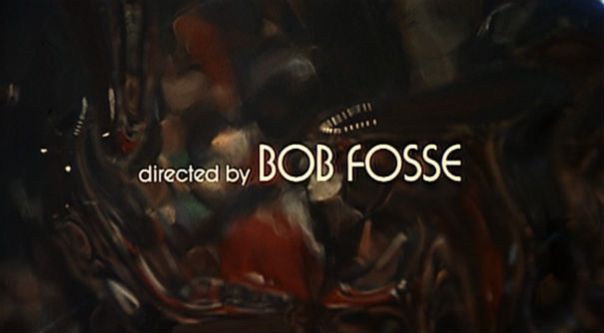





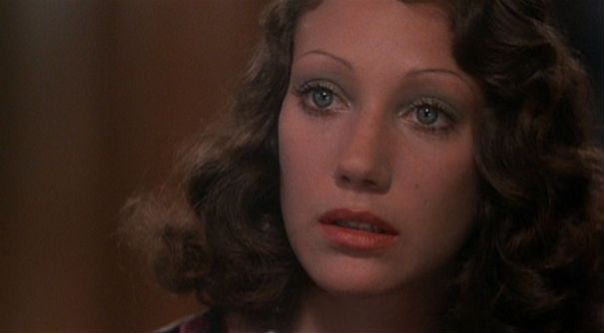














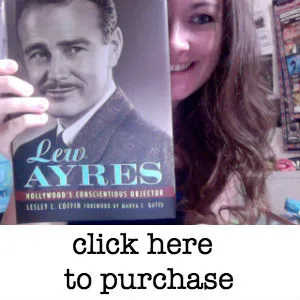

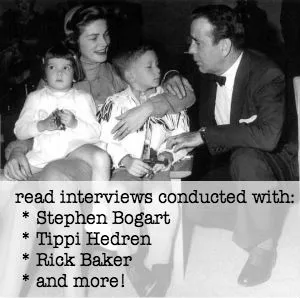
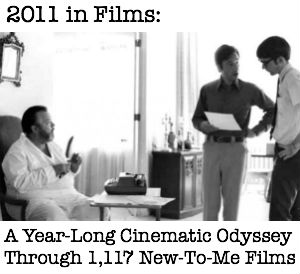
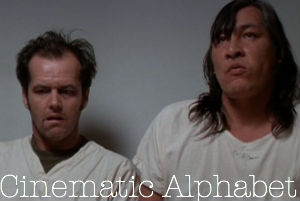

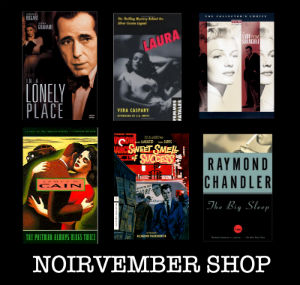








great summary. i have a question, near the end when brian takes the train, he looks at sally’s fingers and said “shocking”.. why??
That’s a reference back to earlier in the film when she calls her nails shocking
Oh, i missed that one. Thank you!!
Pingback: New From WarnerBlu: Cabaret 40th Anniversary Blu-ray Book « the diary of a film history fanatic
Pingback: Music Monday – Tomorrow Belongs To Me – Cabaret | Jen's Pen Den